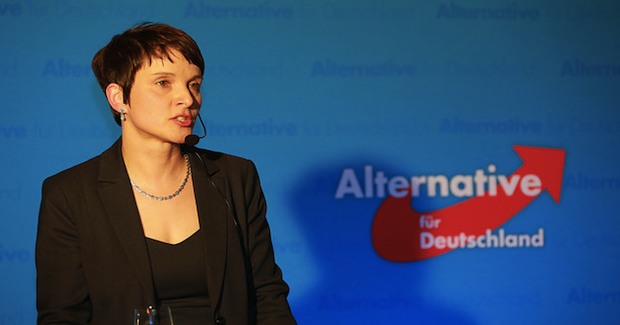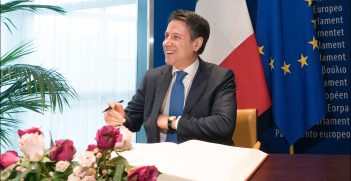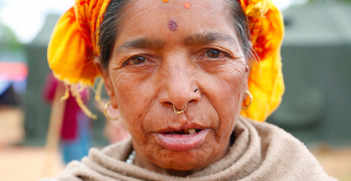Germany: The Rise of Far-Right Frauke Petry

In the wake of the pre-Christmas Berlin market attack, German far-right leader Frauke Petry declared “horror has arrived” and that the German Christian tradition was under threat. Petry heads The Alternative for Germany party, which seems certain to enter the Bundestag in the 2017 elections. Who is she, and what does the party stand for?
Until about three years ago, Germany appeared to be relatively immune to the surge of right-wing populist movements which were afflicting other European democracies. Until the 2013 federal elections it seemed unthinkable that a party to the right of the Christian Democrats would be able to send representatives to the German parliament in Berlin, the Bundestag. That year, the newly founded Alternative für Deutschland (Alternative for Germany) or AfD narrowly missed the 5 per cent threshold designed to keep splinter parties out of parliament.
The new party’s founder Bernd Lucke was a professor of economics whose politics differed from that of the established parties. This is mainly because he was critical of the European Union and wanted Germany to leave the Eurozone and return to the Deutschmark. In 2013, at the height of the Greek debt crisis, the party appealed to voters because of its Eurosceptic stance. While the AfD was populist, its program had only little in common with that of other populist parties on the right of the political spectrum in Europe, such as Marine Le Pen’s Front National in France, the Partij voor de Vrijheid of Dutchman Geert Wilders, or Hans-Christian Strache’s Freedom Party in Austria.
Over the past two years, however, the AfD has come to resemble its older cousins in France, the Netherlands and Austria. While the EU remains one of its principal targets, it is no longer advocating economic liberalism, which had been central to Lucke’s political agenda. It is now fervently nationalistic and openly xenophobic. It is opposed to the admission of asylum seekers and refugees, and wants to curb the immigration of Muslims.
This change of direction was the result of an internal power struggle, which pitted Lucke and his supporters against conservative ultra-nationalists, including one of Lucke’s two co-leaders, Frauke Petry. At a party congress in 2015, Petry won power and Lucke resigned from the AfD. Since then, Petry, who comes from the East German state of Saxony, has shared the party’s leadership with Jörg Meuthen, the leader of the AfD in the West German state of Baden-Württemberg. He is one of the last remaining prominent AfD politicians whose politics are similar to those of AfD founder Lucke.
Petry was born in 1975 in Dresden in the southeast of East Germany. Her father, an engineer, fled to West Germany when she was a teenager. After the fall of the wall, she and her mother also moved to the West. Following in the footsteps of her mother, Frauke Petry trained to become a chemist. She did her undergraduate studies in England, and then gained a doctorate in chemistry from the University of Göttingen. After working in the academy for several years, in 2007 she returned to her native Saxony to set up a company that produces a polyurethane tyre filler invented by her mother. In 2012, Petry was awarded an honour by the German government for being a successful innovator and entrepreneur. One year later, her company became insolvent and Petry, who was its guarantor, had to declare bankruptcy. The company was eventually taken over by a group of investors, and until early this year, Petry remained its managing director.
Frauke Petry had four children with her former husband Sven, a Lutheran pastor but the couple separated last year. Since then her partner has been Marcus Pretzell, the leader of the AfD in North Rhine-Westphalia. She has tried to draw attention to the fact that unlike her bête noire Angela Merkel (who is often referred to as “Mutti”, or mum, in Germany), she is a mother and is therefore able to imagine a future beyond her own lifespan.
Petry had not been politically active before 2013, but played a prominent role in the AfD from the party’s fledgling beginnings in 2013. In the 2014 state elections in Saxony, the AfD won 9.7 per cent of the popular vote (even though the the far-right ultranationalist National Democratic Party only very narrowly missed the 5 per cent threshold) and Petry became its parliamentary leader.
The party’s decision to follow Petry rather than Lucke coincided with its growing appeal to German voters. The next federal elections are scheduled for September 2017. This seems still a long way from now, but at this point two key outcomes of the election seem already certain: Angela Merkel will be the next German chancellor, and the AfD will comfortably get over the 5 per cent threshold and be represented in the Bundestag.
Petry will stand in the electorate of Sächsische Schweiz, a hotbed of violent anti-refugee protests and a stronghold of the far-right. She has a fair chance of attracting more votes than the candidate of the Christian Democrats, and of being elected directly. But it is not certain that Petry will lead the AfD in the Bundestag. Recently the party decided against choosing a leading candidate for the 2017 elections. Instead the party’s campaign will focus on a team. It has not yet been decided who will be in that team.
The fact that Petry will at best be the most prominent member of a small team is due to her lack of support among the party’s leadership. Pretzell is her only staunch ally. Meuthen and Petry have been at odds ever since they were elected jointly to lead the party. While Meuthen is a moderate, he has been able to win the support of powerful party vice-president, Alexander Gauland, and of two regional heavyweights whose politics place them to the right of Petry: Björn Höcke, the firebrand leader of the AfD in Thuringia and his political ally André Poggenburg from Sachsen-Anhalt. Höcke is ambitious and would like to replace Petry at the helm of the party. That may also be true for Beatrix von Storch, who is currently the AfD’s leader in the European parliament, but who will seek a seat in the Bundestag next year. Her politics are also more extreme than Petry’s. Much like Pauline Hanson’s One Nation Party in Australia, the AfD has been beset by internal power struggles and resignations of members of parliament; if the party continues to be successful in elections, these conflicts will intensify rather than diminish.
While Petry may appear to be a moderate when compared with the likes of Höcke, however, she too has been advocating extreme positions. Nevertheless, more so than her male colleagues in the AfD leadership, Petry is an opportunist, rather than an ideologue. As she is not a particularly gifted speaker and is comparatively mild-mannered, she also does not come across as a demagogue.
Whereas Wilders and Le Pen have an outside chance of becoming Dutch prime minister and French president, respectively, when the people of the Netherlands and France vote in March and April next year, all that Petry can hope for is to come first in her electorate. Poland and Hungary are now run by the populist right. In other European countries, the government relies on the support of right-wing populist parties, or such parties are part of a governing coalition. Neither scenario seems likely in Germany. So far, no other party has agreed to enter into a power-sharing agreement with the AfD, although a few Christian Democrats and the deputy leader of the left-wing Die Linke, Sarah Wagenknecht, have identified areas where their own and AfD positions overlap. If for some reason the AfD were eventually perceived to qualify for some sort of collaboration with the establishment parties, however, then it would be because of Petry, and in spite of leaders such as Höcke.
Klaus Neumann is professor of history at the Swinburne Institute for Social Research, Swinburne University of Technology. He has held teaching and research positions in universities in Germany and Australia.
This article is published under a Creative Commons Licence and may be republished with attribution.





